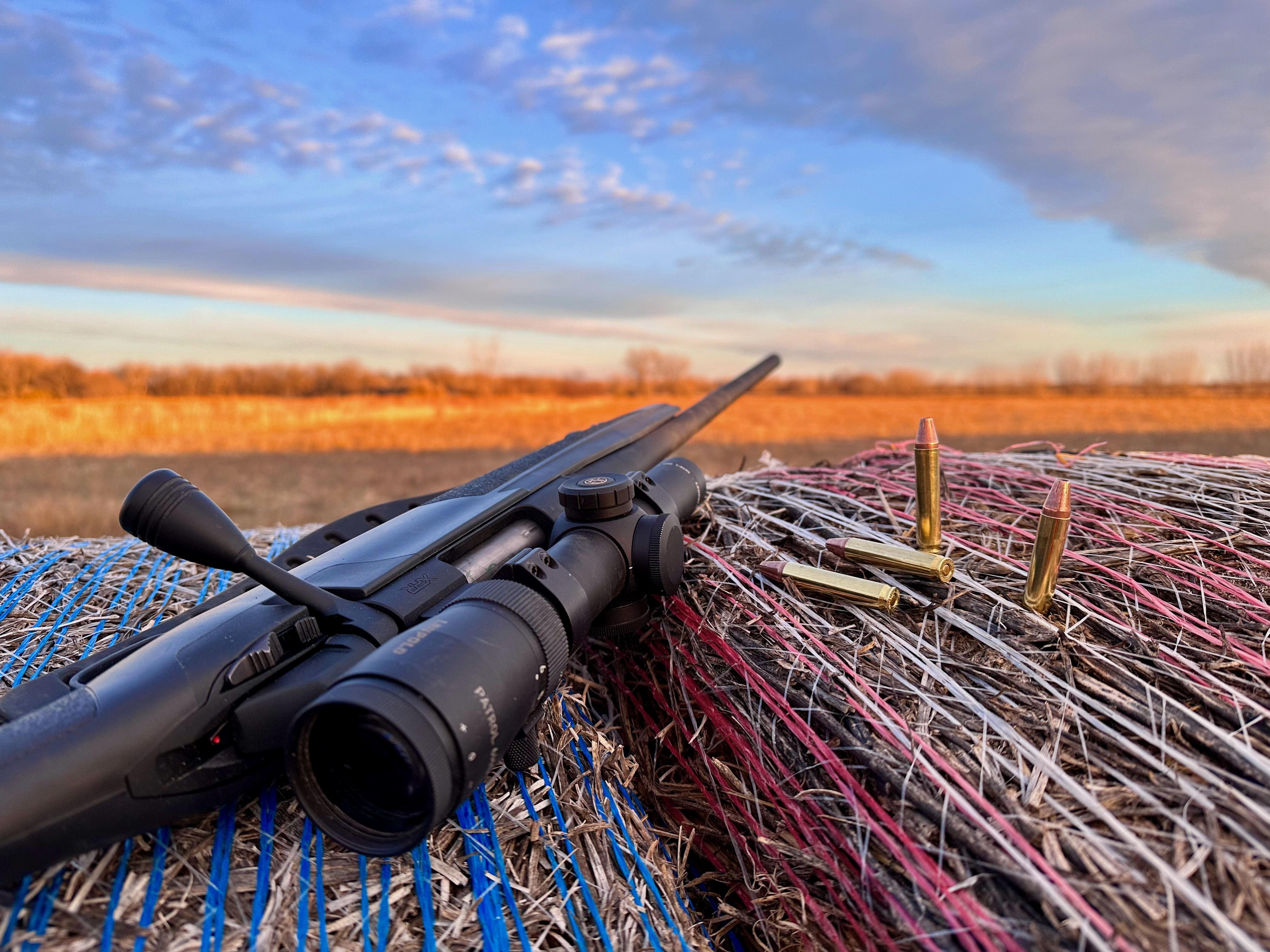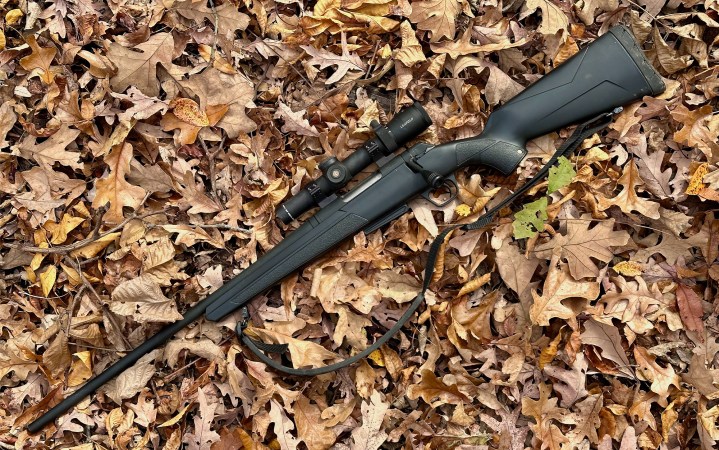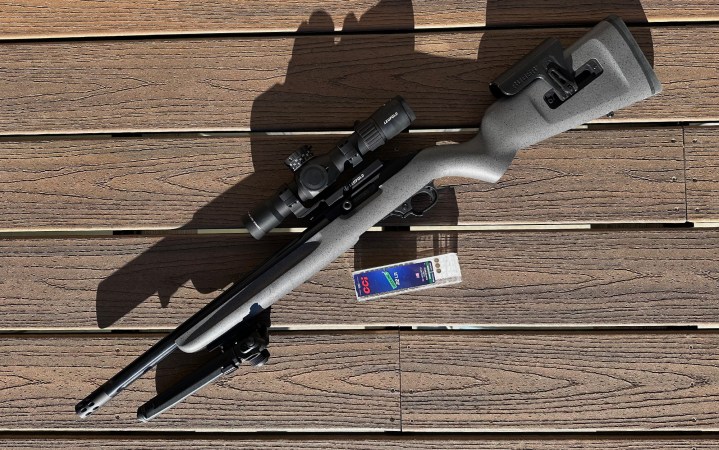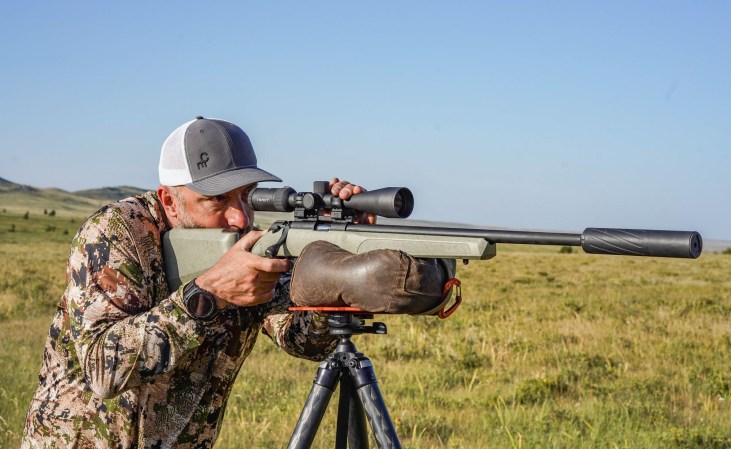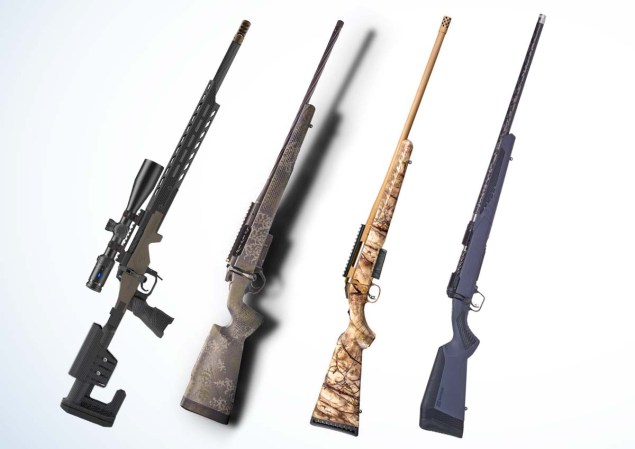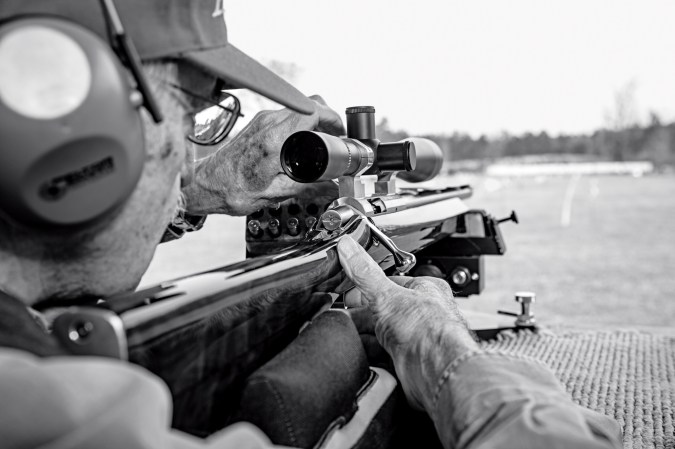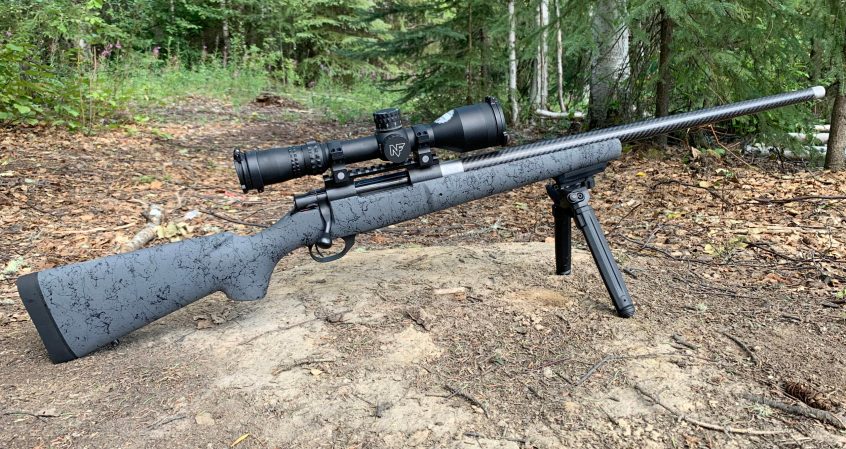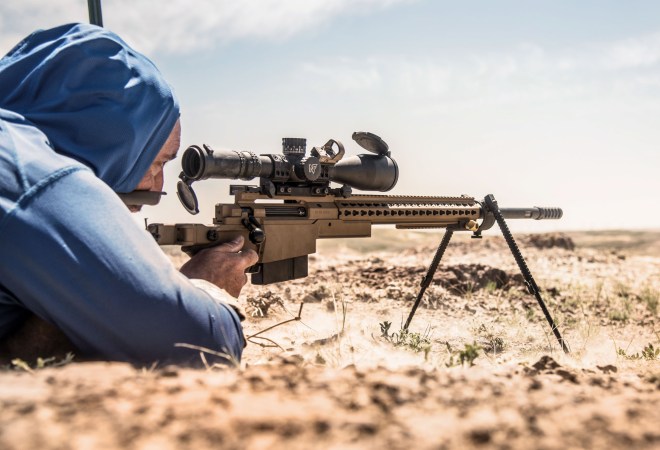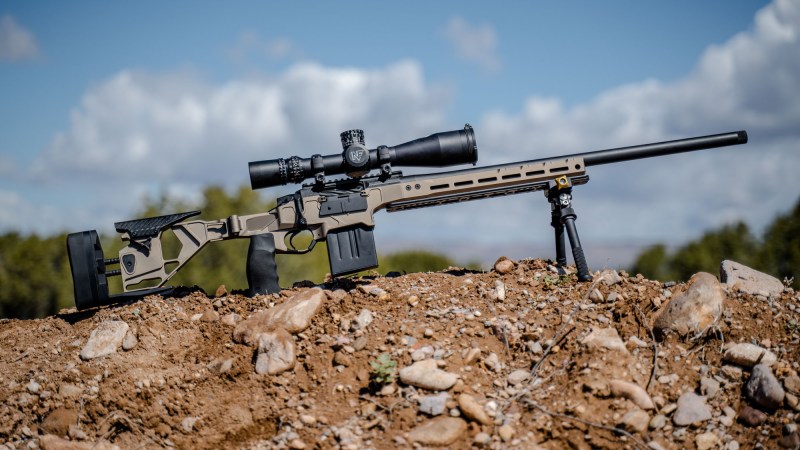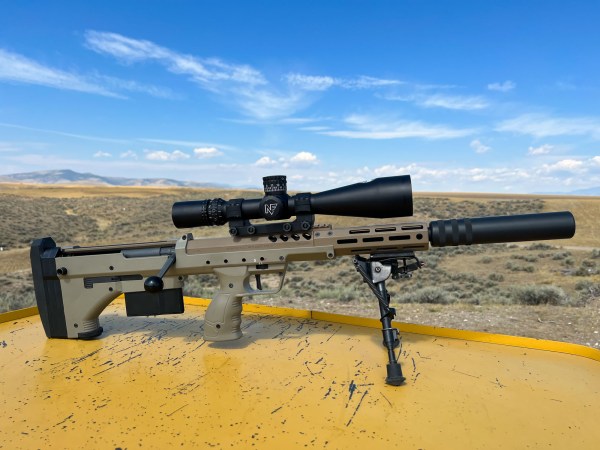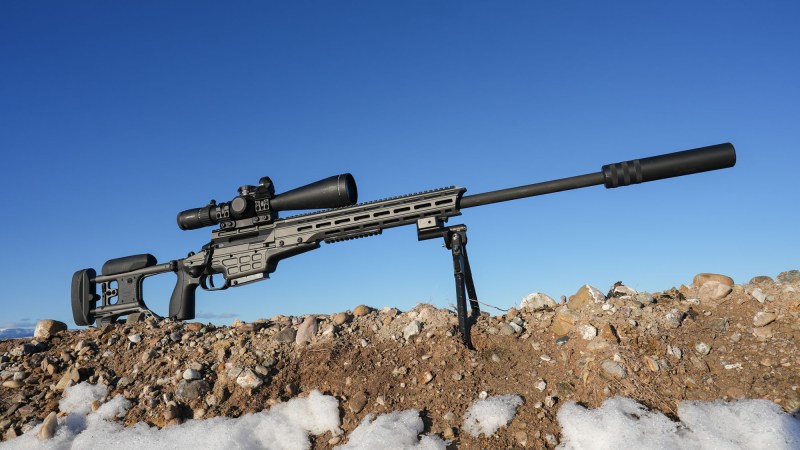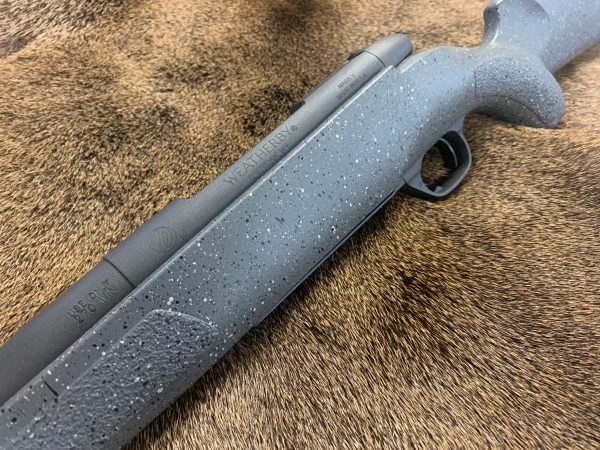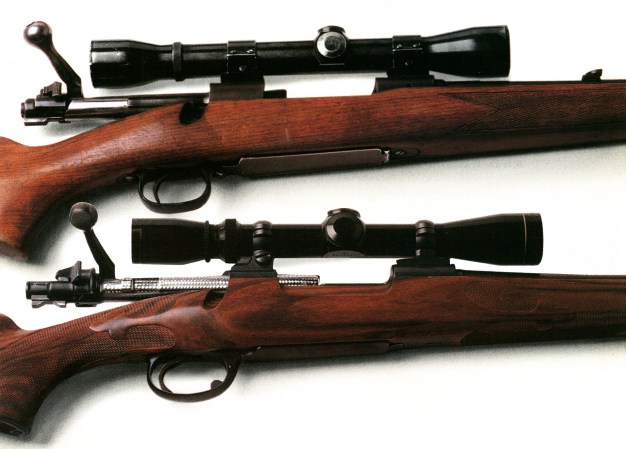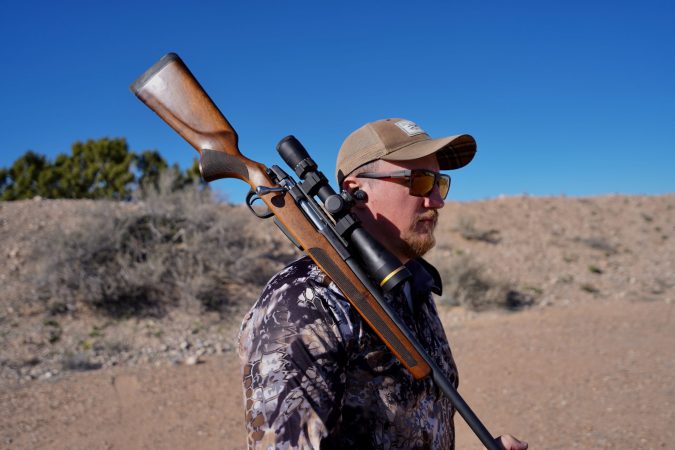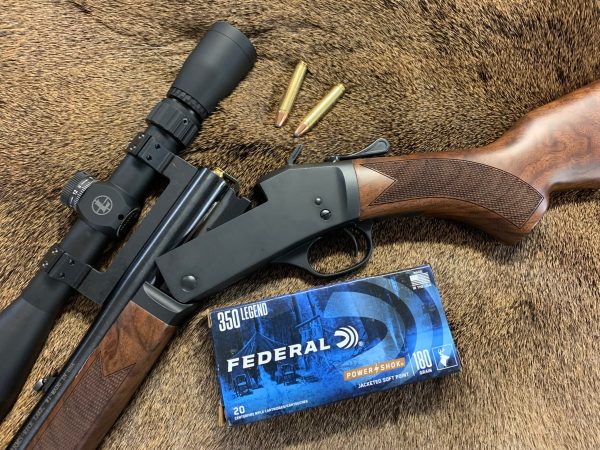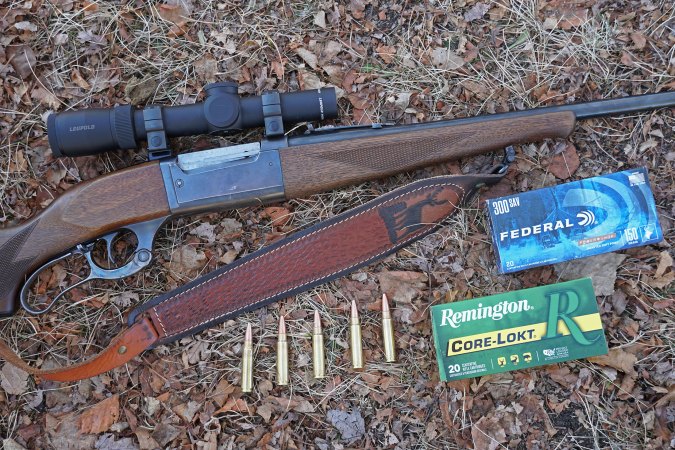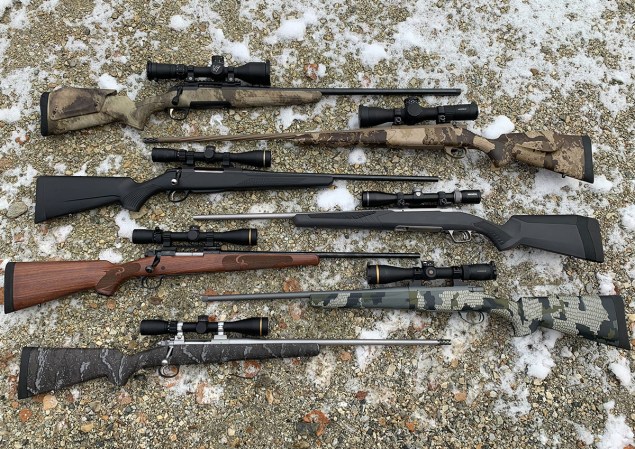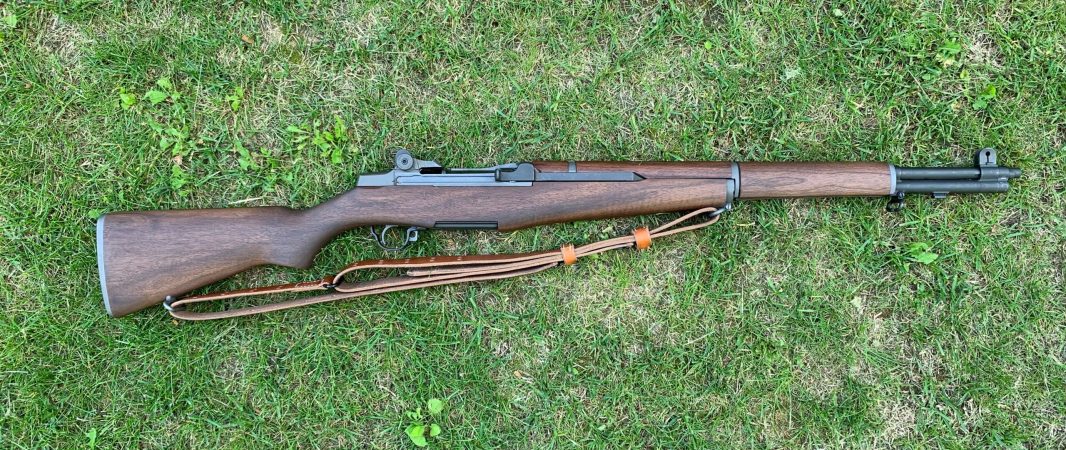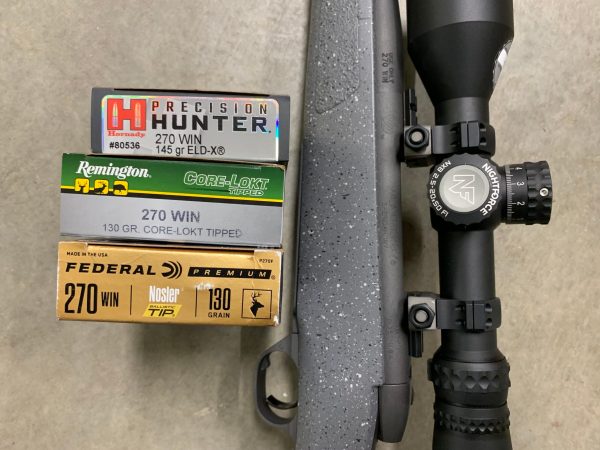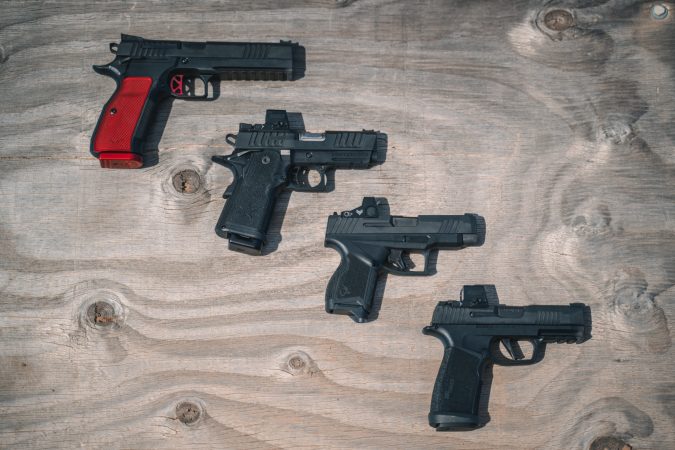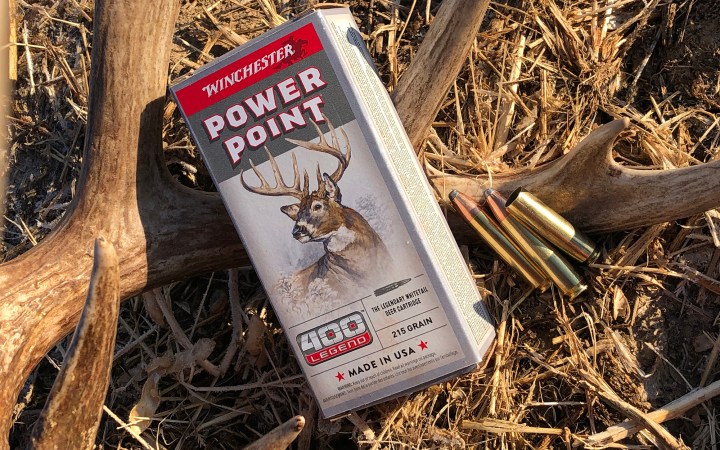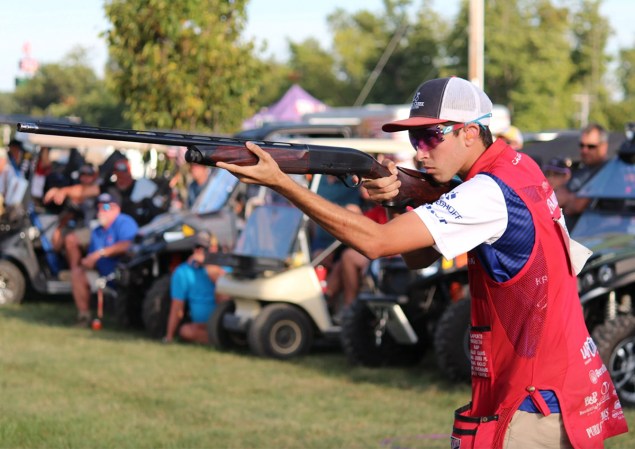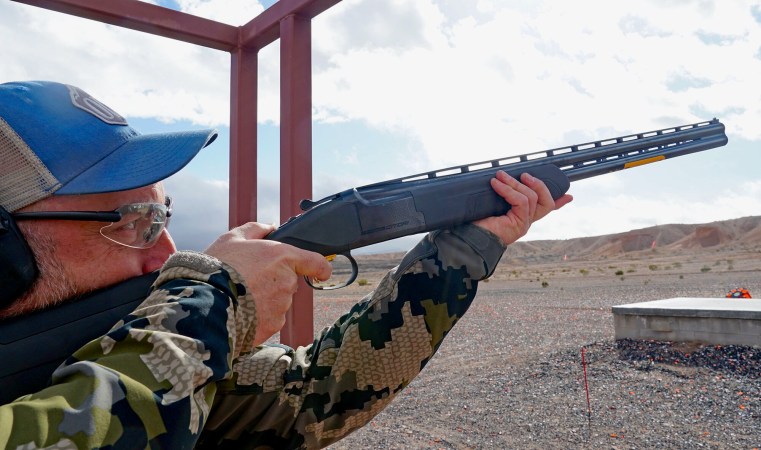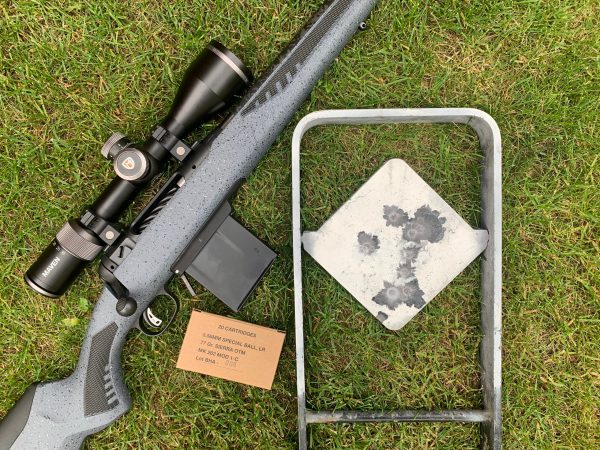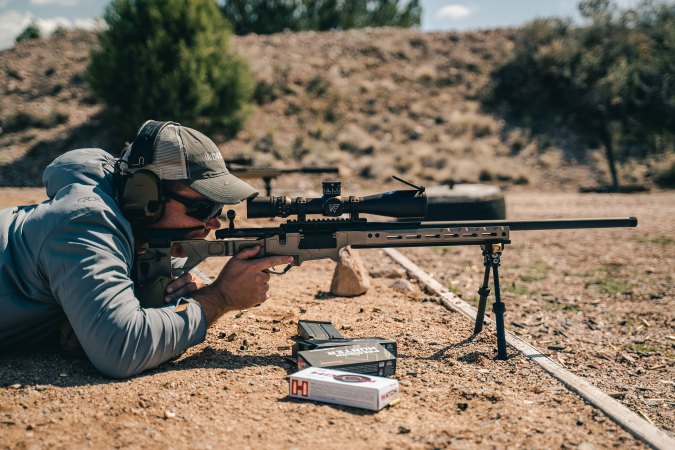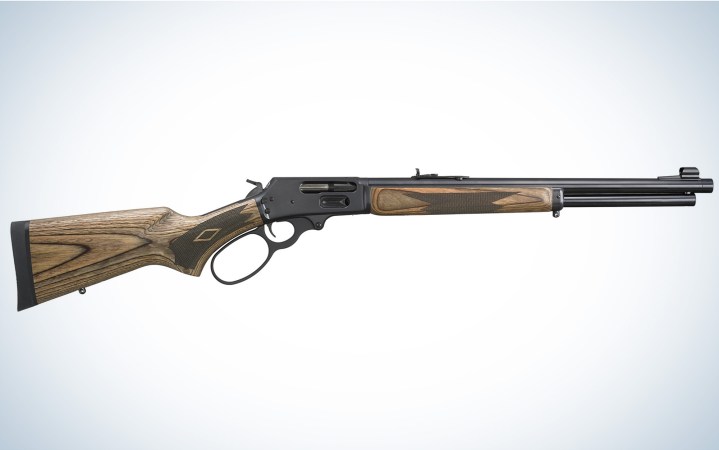We may earn revenue from the products available on this page and participate in affiliate programs. Learn More ›
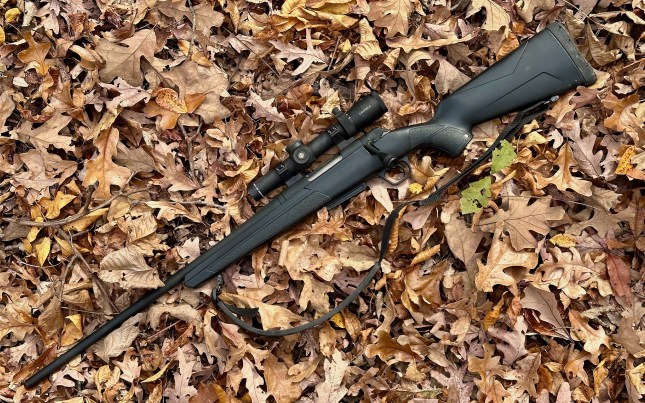
Winchester XPR 350 Legend
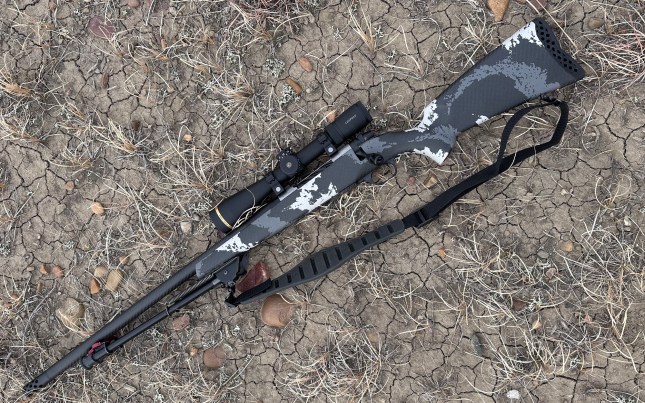
Weatherby Mark V Backcountry 2.0 TI Carbon 6.5 Wby RPM
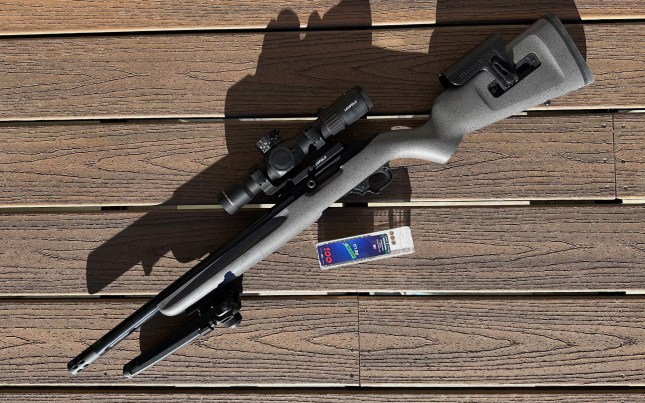
Ruger 10/22 Competition Rifle
There’s not a serious left-handed shooter who can’t work a righty bolt gun effectively, if not particularly gracefully. Same can be said of off-handed safeties on semi-auto shotguns, or bolt- and magazine-release controls on ARs.
Southpaws have figured out how to make do in the right-handed world of firearms design. But it’s a relief — and a welcome reminder that we’re not all thumbs — when we get the chance to operate left-handed actions. A few manufacturers recognized years ago that while lefties might be only 10 percent of the population, the percentage of southpaw shooters is somewhat higher, and these brands devoted some of their production to us off-handed freaks. Ruger, Savage, Tikka, and Weatherby all produce their most popular bolt-action rifles in left-handed actions.
Companies that will go to great lengths to extend product lines to hyper niche audiences of right-handed rifle shooters — I’m looking at you, Mossberg, Kimber, and Nosler — apparently think left-handers beneath their investment.
Happily, a few brands that have historically ignored lefties have introduced models over the past year that not only check the participation box but bring noteworthy performance to the southpaw market. I hunted this fall with three of these models — Winchester’s new lefty XPR, Weatherby’s remarkable Mark V Backcountry 2.0 TI Carbon, and a new left-handed 10/22 from Ruger’s Custom Shop — and confirm that they offer great performance for lefties looking for reasons to abandon their wrong-handed guns.
And more good news for lefties is on the horizon. At least two other companies, Christensen Arms and Bergara, are coming out with either new lefty models this month or are expanding their left-hand models into new configurations.
New for 2024 Left-Handed Rifles
Winchester XPR Left-Hand 350 Legend
Specs
- Calibers: 350 Legend (tested), .308 Win., .30/06 Springfield, .300 Win Mag, 6.5 Creedmoor
- Action: Left-handed bolt action, 60-degree bolt throw, 3-lug bolt
- Stock: Black polymer with Inflex Technology recoil pad
- Barrel: 22-inch (350 Legend) steel button-rifled with Perma-Cote finish and recessed target crown
- Twist Rate: 1:16 for .350 Legend
- Trigger: M.O.A. adjustable trigger (adjustment range: 3-5 pounds)
- Safety: Two-position with bolt-unlock button
- Magazine: 3-round detachable
- Length of Pull: 13-3/4 inches
- Overall Length: 42 inches
- Weight: 6 pounds, 12 ounces
- Price: $699
Features
- Affordable and versatile
- Short barrel and compact build perfect for beginning hunters and shooters
- Excellent trigger
- Solid selection of calibers
Pros
- Snappy handling
- Durable construction
- Excellent components
Cons
- Barrel not threaded for suppressors
- Distended magazine makes one-hand carry difficult
- Straight-wall cartridges not optimized for bolt actions
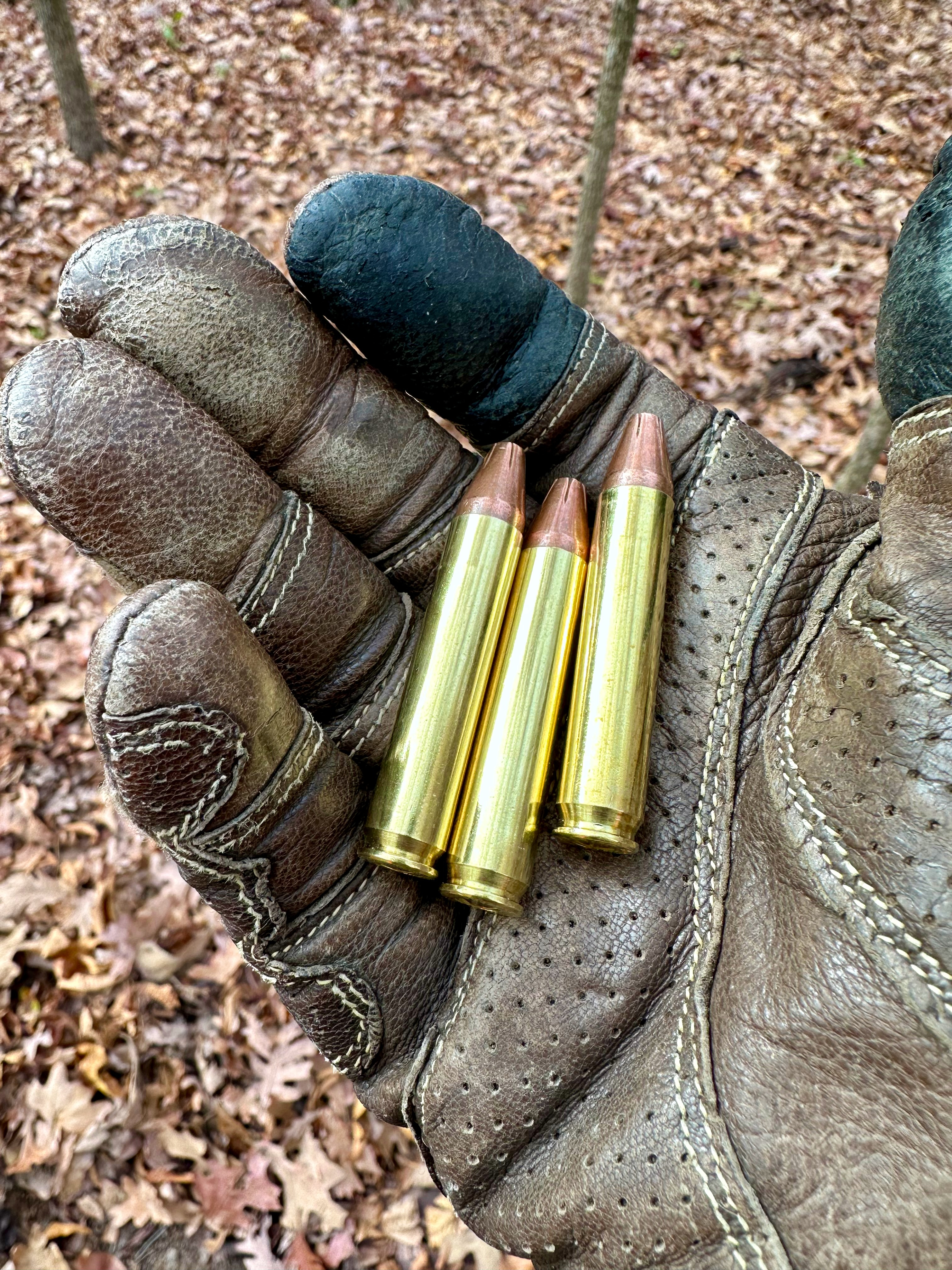
Andrew McKean
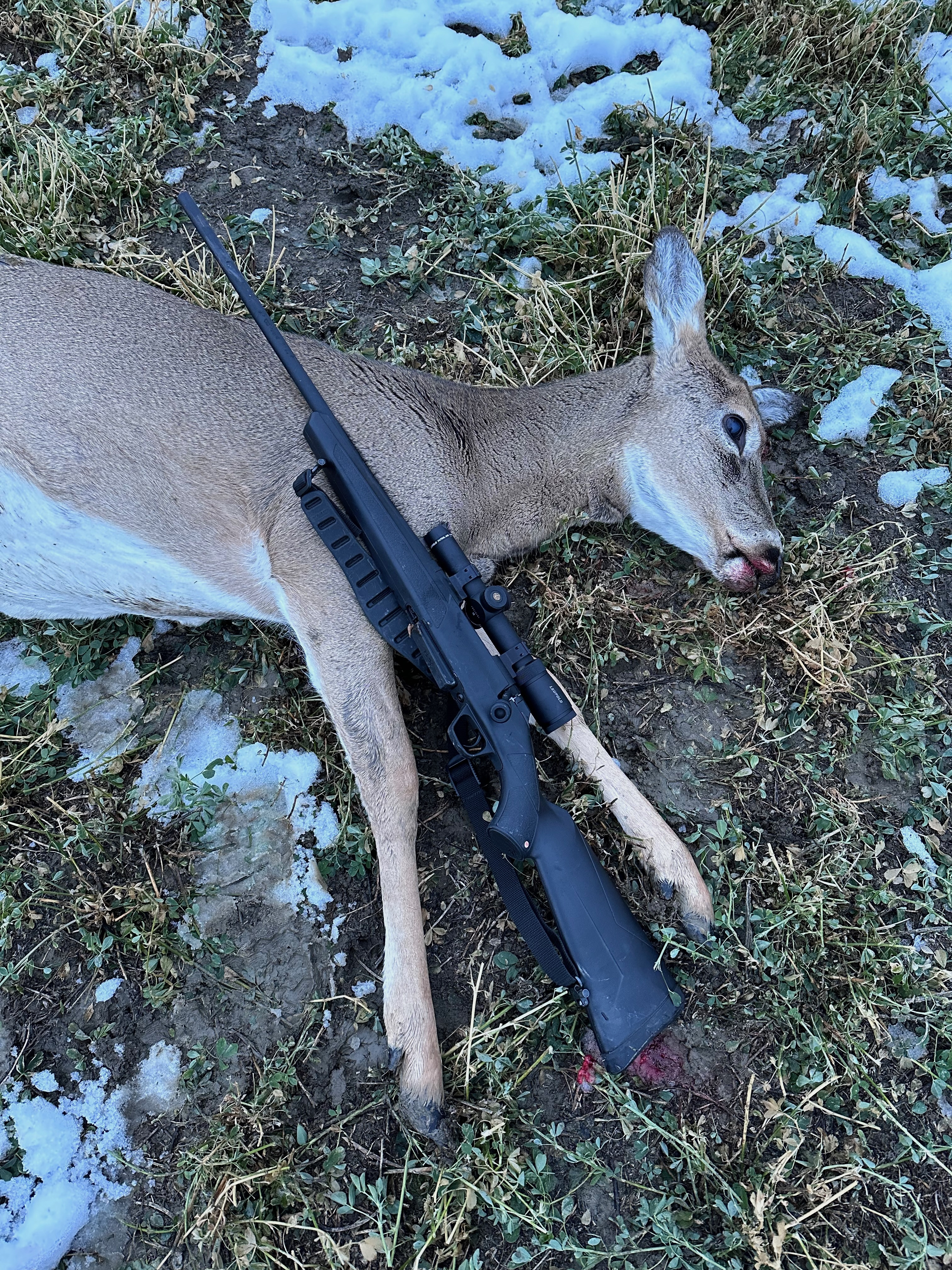
Andrew McKean
The highlight of my whitetail season was slinging this new and nimble Winchester across the river bottoms of northeast Montana and later in the hardwoods of Kentucky. My test rifle was chambered in 350 Legend, and I came away impressed with this fast, fun, deadly rifle-and-caliber combination.
The XPR is so easy to handle for small-framed shooters, so mild mannered in terms of recoil and report, and so deadly in mid-range situations, out to about 250 yards, it’s become my new apprentice rifle, offered to beginning hunters in my tribe, regardless of whether they’re righties or lefties.
The Winchester’s 22-inch barrel and 13-3/4 length of pull is perfect for the sort of ground hunting I prefer for whitetails. It points like a quail gun for snap shots at moving deer and, at 6 pounds, 12 ounces, has enough weight-forward heft to make killing shots off shooting sticks and bipods out to 200 yards. Topped with Leupold’s 1-6×24 Patrol 6HD, its close-quarters talents make it an awesome truck gun. In a 22-inch barrel, the southpaw XPR is chambered in 350 Legend, .308 Win., and 6.5 Creedmoor. The 24-inch version is chambered in 6.8 Western and .30/06 Springfield, and you can get a lefty .300 Win Mag with a 26-inch barrel.
There’s a spiffy TrueTimber camo version of the lefty XPR in both 350 Legend and 6.8 Western, but the basic gun is, well, pretty basic. It has a black polymer stock, Perma-Cote finish on the barrel and receiver, a three-round detachable box magazine, and an adjustable M.O.A. trigger that is factory-set at 3.5 pounds. It carries an MSRP of $700, which is about right for the reliability, durability, and accuracy it delivers.
My 350 Legend shot each of three loads I fed it fairly well. Winchester’s 180-grain Power Point, a traditional cup-and-core soft point, is probably the thumper bullet I’d opt for at closer ranges, but I struggled to get it to group tighter than 1.5 inches at 100 yards. Winchester’s 150-grain Copper Impact was the most accurate of my test loads, printing 1.1-inch five-shot groups at 100 yards. I killed a Montana whitetail doe with this bullet, making a double-lung hit at about 175 yards. Surprisingly, the deer went about 200 yards before tipping over dead.
In the Field
Based on that disappointing terminal performance, I opted for the best combination of accuracy and delivered energy for a destination whitetail hunt in western Kentucky. That load: Winchester’s 160-grain Power Max bonded bullet. It shot just over MOA both off the bench and off shooting sticks, and on a tune-up doe hunt in Montana a whitetail I shot at about 130 yards went only 30 yards before piling up.
In Kentucky, I hauled the XPR up to a platform stand in a mature oak where its short barrel and Leupold’s LPVO scope proved a capable treestand gun. But ultimately, I climbed out of the heavens and rattled in a fine hardwoods buck from the ground, making a 45-yard snap shot at the buck cruising through the timber.
Yes, the Winchester XPR is just another plastic-stocked bolt gun, but a few details elevate it above the scrum. The M.O.A. trigger is crisp and tight. The 60-degree bolt is fast, its speed enabled by the oversized bolt handle, and the three-lug action locks up quick and strong. I haven’t worked the long-action XPR, but the short action is smooth, with no bolt binding.
While the XPR doesn’t have a true three-position safety, the two-position operation has a tab in front of the safety that, when depressed, allows shooters to open the bolt while the safety is engaged. I might observe that the left-side safety is easily reachable for right-handed shooters.
In my final assessment, the XPR is a gun that is more than the sum of its parts. It’s a lively, fun, deadly rifle that will be a welcome addition to the short roster of capable left-handed bolt-action rifles.
Final Thoughts on the Left-Handed Winchester XPR
There are no sour notes with this gun. The XPR platform is proven, and the lefty version is tight, responsive, and fun. Is the 350 Legend the perfect chambering for a bolt gun? No, but it makes the Winchester a spectacular whitetail rifle for stand hunters, and it’s a wonderful first rifle for beginning hunters. Whether they’re lefties or not.
Weatherby Mark V Backcountry 2.0 TI Carbon 6.5 Wby RPM
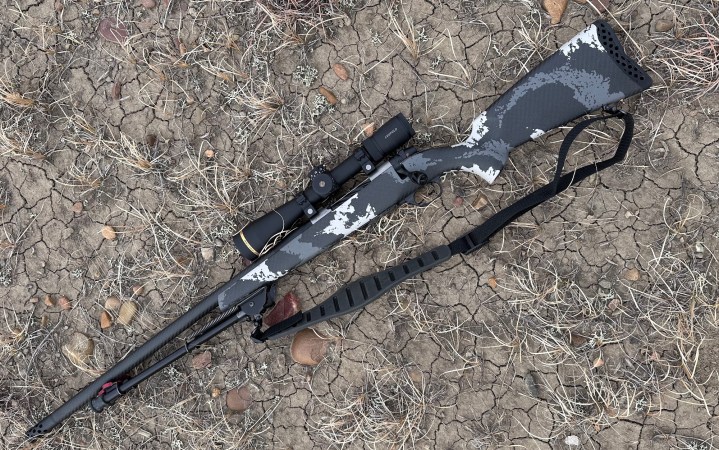
Andrew McKean
Specs
- Weight: 5.4 pounds
- Action: 6-lug Titanium Mark V full-length receiver, left-handed bolt, 54-degree bolt throw
- Stock: Peak 44 Blacktooth carbon fiber with gray-and-white sponge camo pattern
- Barrel: #4 profile carbon-fiber, 26 inches (plus 2 inches for muzzle brake), 1:8 twist rate, 5/8-24 muzzle thread, ships with Accubrake ST
- Overall Length: 46.5 inches
- Magazine Capacity: Four
- Length of Pull: 13.5 inches
- Calibers Available: .240 Wby Mag, .243 Win., .257 Wby Mag, .300 Wby Mag, .338 Wby RPM, 6.5 Creedmoor, 6.5 Wby RPM, 6.5-300 Wby Mag
- Price: $3,949
Features
- At 5.43 pounds (measured) one of the lightest production bolt-action rifles on the market
- Titanium Mark V receiver
- Carbon fiber tension-wrapped barrel from Wisconsin-based BSF Barrels
- Ships with 30-port Accubrake ST muzzle brake
- True carbon fiber stock (from Peak 44)
- Threaded bolt handle
Pros
- Lightweight
- Wby RPM cartridge designed for Weatherby’s six-lug action
- Left-handed action chambered in eight calibers
- Excellent mountain rifle
- Effective recoil-management components
- Handsome gray-and-white sponge-pattern accents
- Striking metal work, from bolt handle to bottom metal
Cons
- At nearly $4,000 it’s a pricey rifle
- Takes practice to shoot accurately
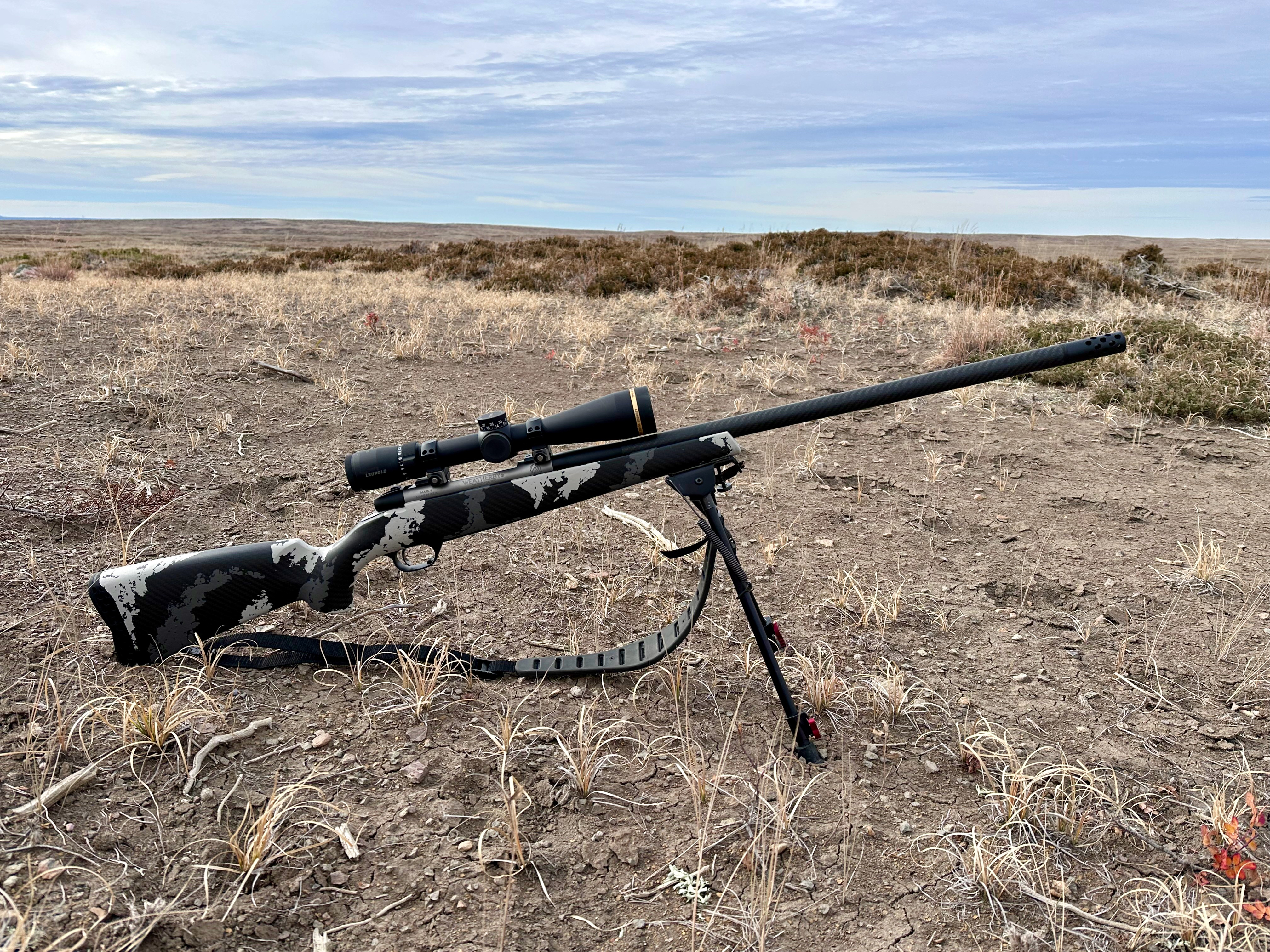
In the hierarchy of premium production lightweight mountain rifles, Weatherby’s 5.4-pound Mark V Backcountry 2.0 Ti Carbon occupies a vaunted place at the confluence of performance, style, and handling. So it’s gratifying to see the company serve its left-handed customers with a southpaw version of its most feature-filled rifle, and it’s a testament to Weatherby’s commitment to minorities that it chambers this left-hand rifle in its new 6.5 Weatherby RPM, (for Rebated Precision Magnum).
Retailing just shy of $4,000, this is a serious investment, but its components help justify the cost. The heart of the Backcountry Ti Carbon is the proven Mark V action, only in lightweight titanium. The rifle is barreled with what Weatherby calls its “tensioned” carbon-fiber barrel from BSF Barrels, and it’s paired with a carbon-fiber stock from Weatherby’s industry partner, Peak 44.
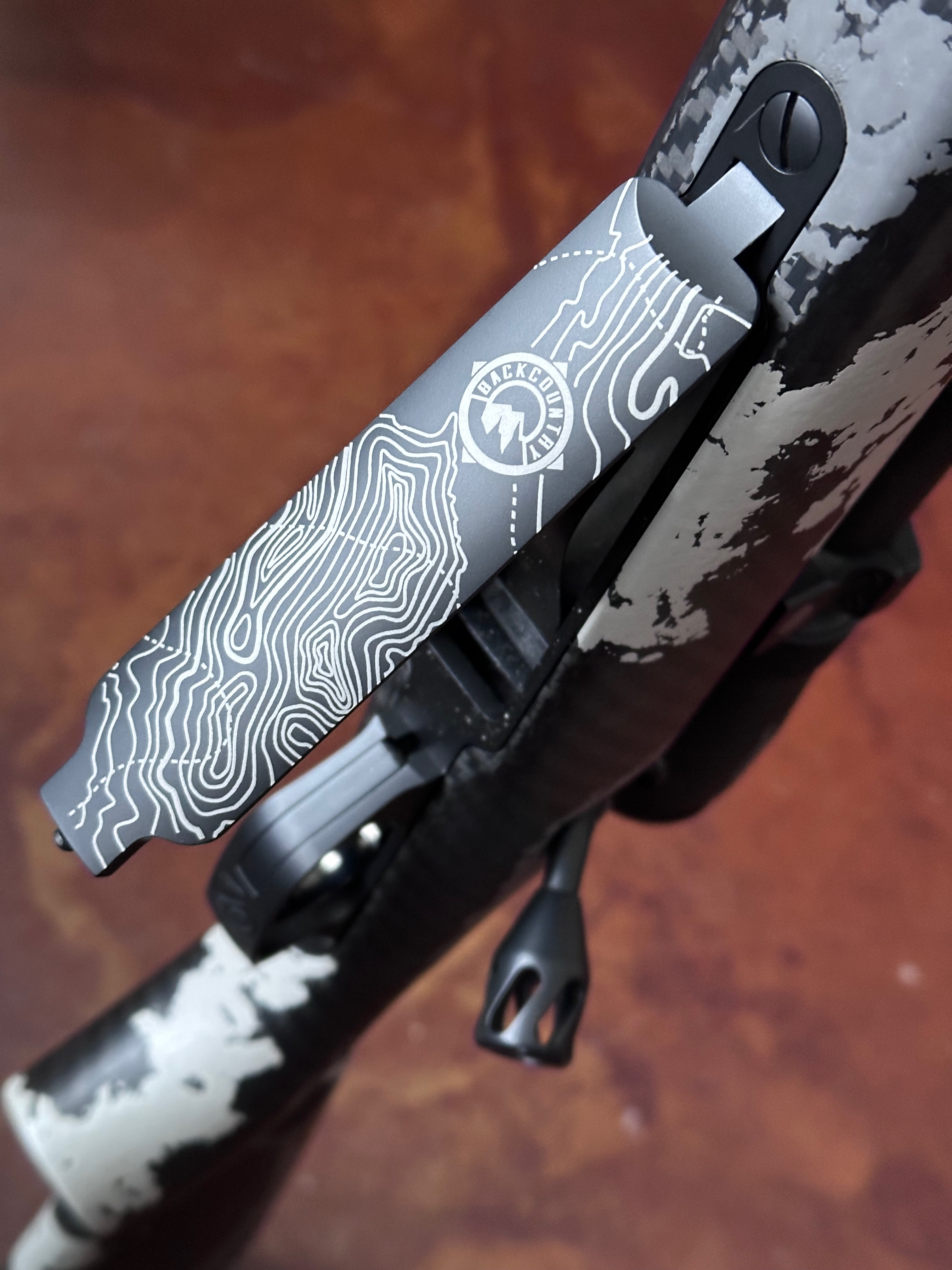
Andrew McKean
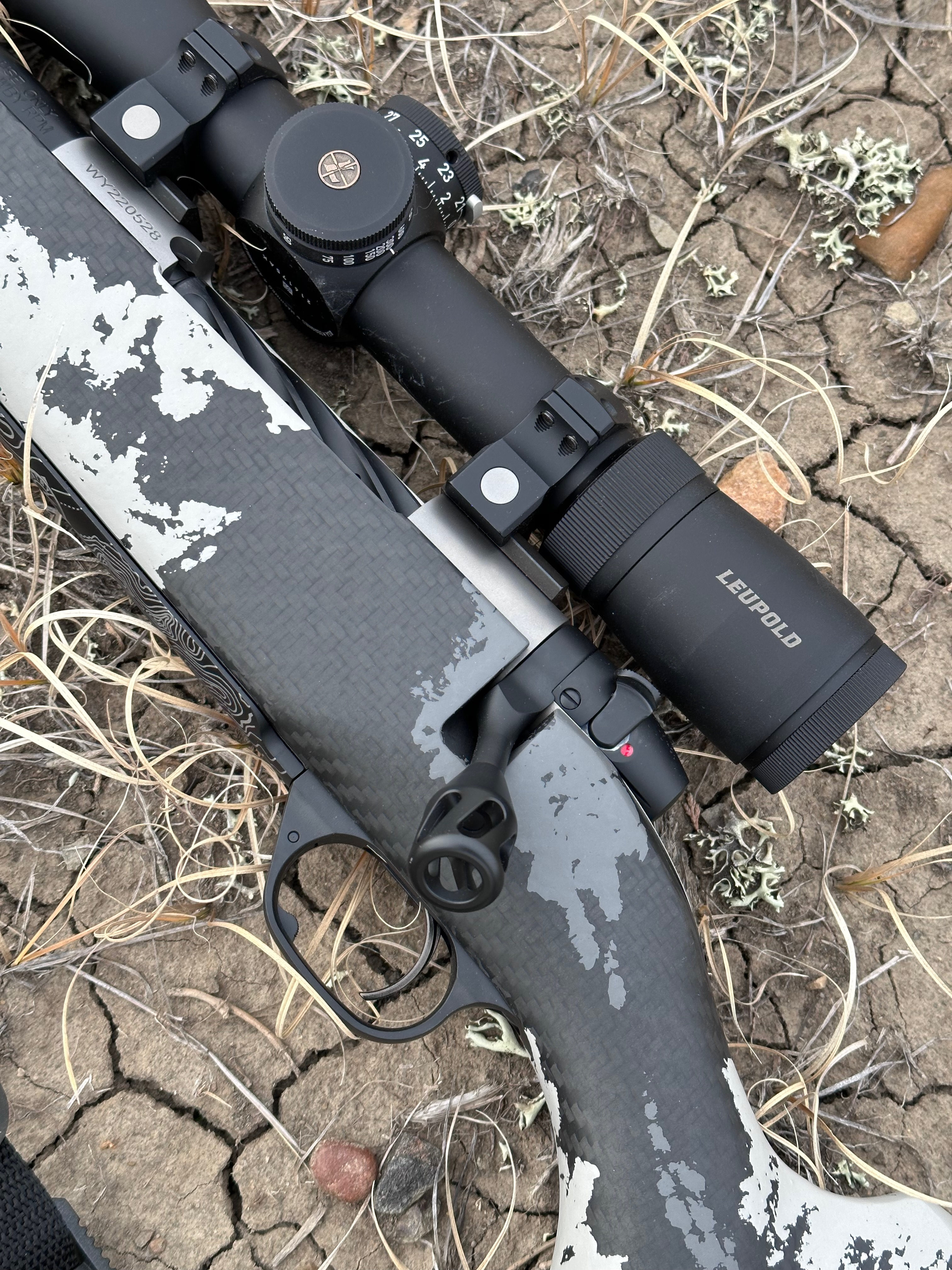
Andrew McKean
My test version was chambered in the red-hot 6.5 Wby RPM, and I worked up both loads and an optic with Montana’s pronghorn antelope season in mind. I settled on the new 124-grain solid-copper Hammer Hunter, which shot nearly as well as the 127-grain Barnes LRX. Because I’ve never hunted with projectiles from Hammer, I chose that bullet for antelope.
In the Field
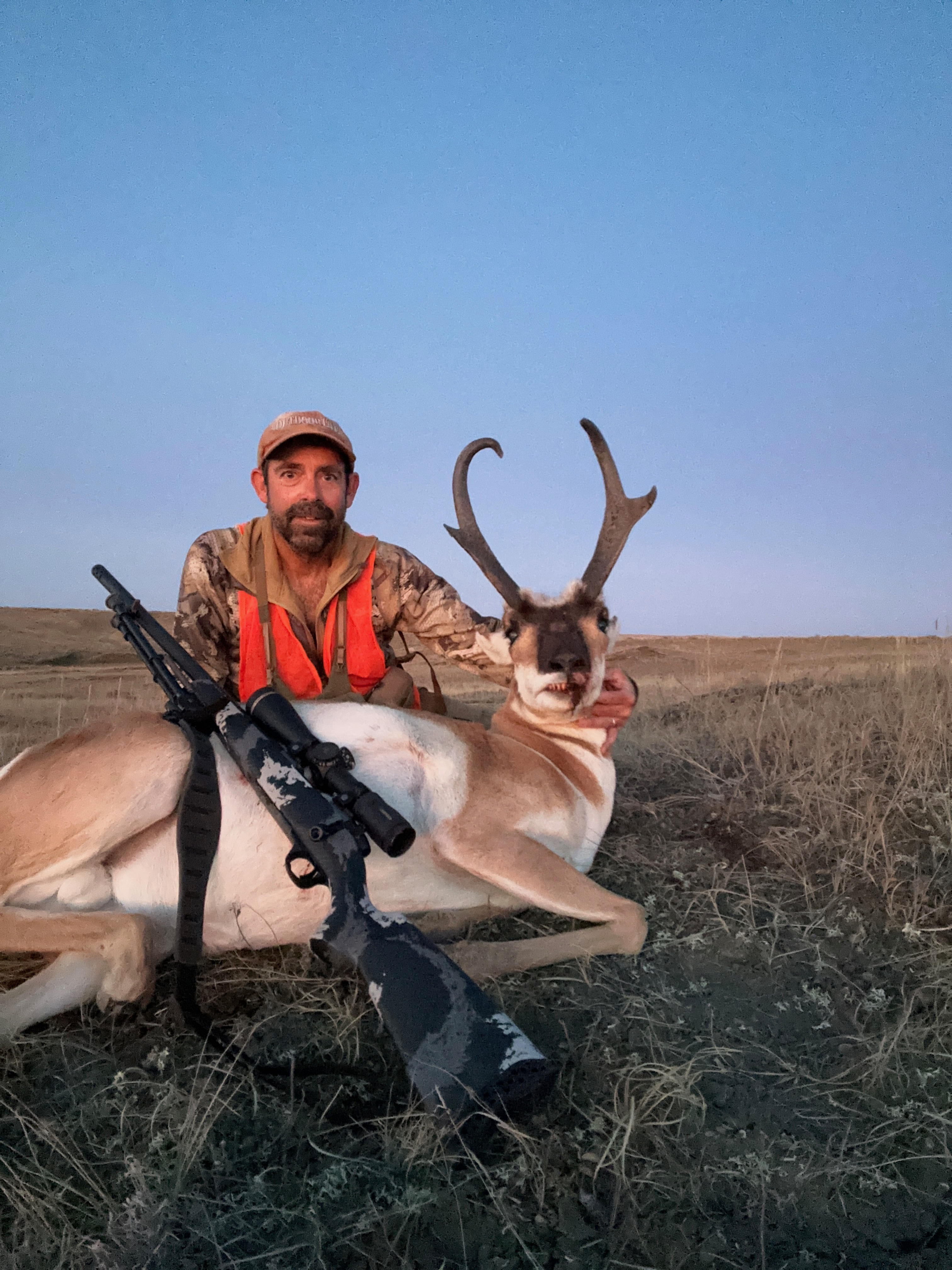
Andrew McKean
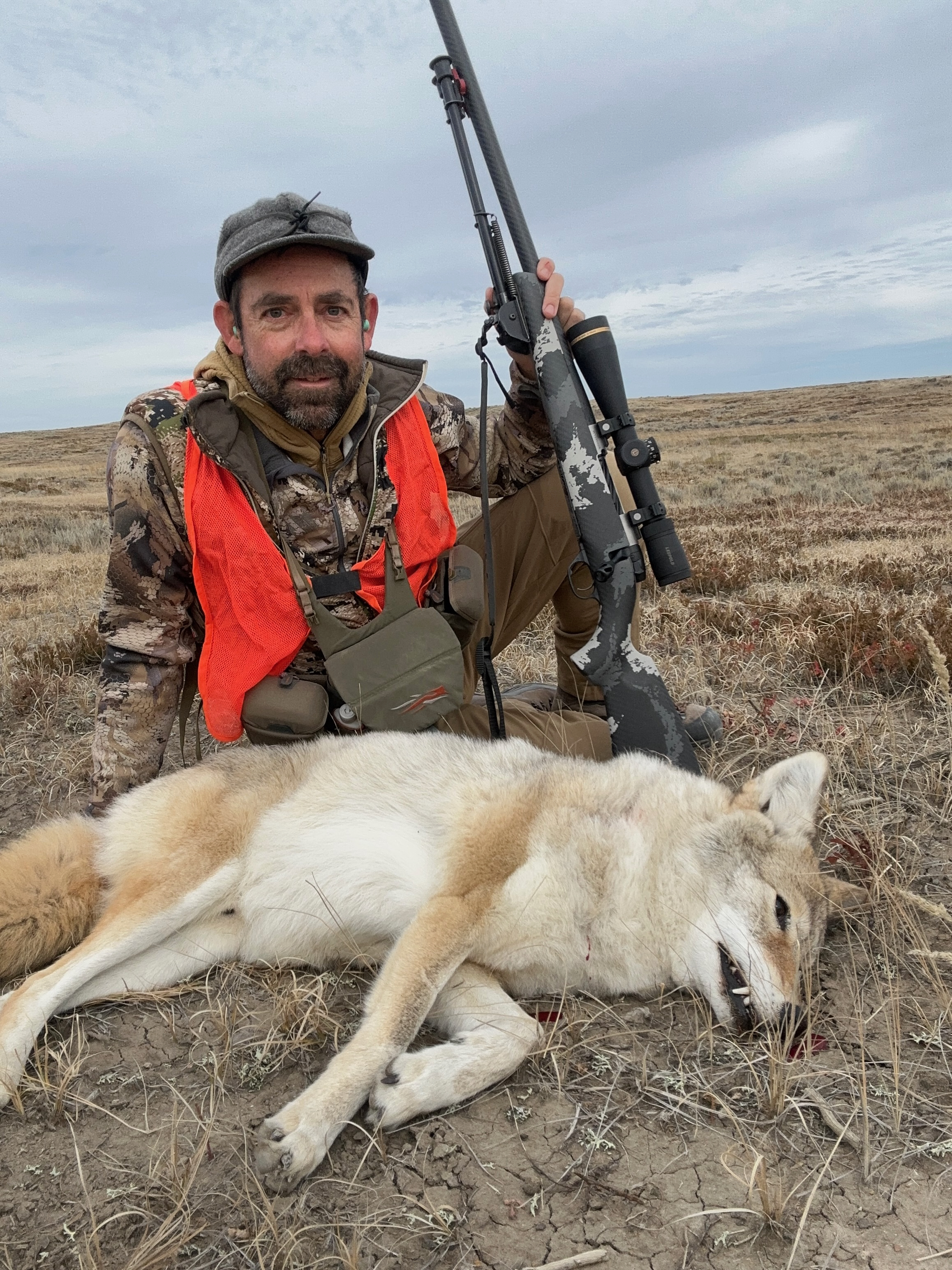
I topped the Weatherby with Maven’s new RS3.2 and later with Leupold’s VX-5HD in 3-15×44 with a custom elevation dial. Prior to hunting Montana pronghorns, I tested the new rifle and load on coyotes, recognizing that a 124-grain copper bullet zipping along at 3,230 feet per second — my recorded average velocity — is a bit much. But the exercise allowed me to get comfortable shooting the lightweight rifle off both a bipod and a tripod topped with Spartan Precision Equipment’s Davros Head.
That experience, and the successful antelope hunt that soon followed, won’t surprise anyone. The 5-pound, 4-ounce rifle is a joy to carry; with the scope, sling, a full four-round magazine, and Harris bipod, the fully equipped hunting rig weighed just under 8 pounds.
That light weight, however, makes the Backcountry Ti Carbon tricky to shoot. The barrel heats quickly, especially with the 81-grain case capacity of the RPM. And the gun is so light that a suppressor messes with the finely tuned balance of the rifle, to the degree that on my antelope hunt I shunned my suppressor in favor of Weatherby’s effective Accubrake ST muzzle brake. Still, even on the bench, I had to really focus to get either load to shoot sub-MOA. I should note, though, that I didn’t send enough rounds through it in various grain weights and bullet types to make conclusions on best loads.
The stock geometry, 3DHEX recoil pad, and muzzle brake combine to do a marvelous job of managing recoil. The hot 6.5 Wby RPM was a joy to shoot, with very little felt recoil and, even more remarkably, very little muzzle jump even without a suppressor.
I’m a stalker, not a long-range hunter, and while I could have air-struck my target buck at 600 yards, I used terrain features and belly-crawling to get within 180 yards and killed him with a single shot. In all, I hiked 14 miles that day in pursuit of prairie antelope, and the Weatherby proved its value proposition as a lightweight companion. So, too, did the left-handed action. As most lefty walk-about hunters can attest, carrying a right-handed bolt rifle on the left side means you’re constantly digging the bolt out of your hip, or worrying that your walking motion is working the bolt open. That wasn’t a worry with the left-facing bolt on the Mark V.
Final Thoughts on the Weatherby Backcountry Mark V Ti Carbon – 6.5 Wby RPM
Finally, left-handed mountain hunters have a production rifle they can carry with confidence and joy. This investment-grade Weatherby is worthy of once-in-a-lifetime trophy hunts.
Ruger 10/22 Competition Rifle Left-Handed Model
Specs
- Chambered in .22 LR
- Fully adjustable cheek rest
- Laminate stock in speckled black/gray finish
- Anodized black aluminum receiver
- 10-round left-hand rotary magazine
- Oversized magazine release lever
- 16.12-inch steel barrel, 1:16 RH twist
- Ships with muzzle brake; barrel threaded to accept suppressor
- Optics-ready 30 MOA Picatinny rail
- BX Trigger with 2.5-3-pound pull weight
- Length of Pull: 13 ½ inches
- Overall Length: 36 inches
- Price: $959
Pros
- Left-handed action keeps gas and brass away from left-handed shooters’ faces
- Comfortable and accuracy-boosting stock components
- 30 MOA rail enables quick optics changes and long-range shooting
- Upgraded trigger
- Threaded barrel
- Hyper-accurate
Cons
- Left-handed rotary magazine isn’t compatible with right-handed magazines
- Prone to stove-pipe jams
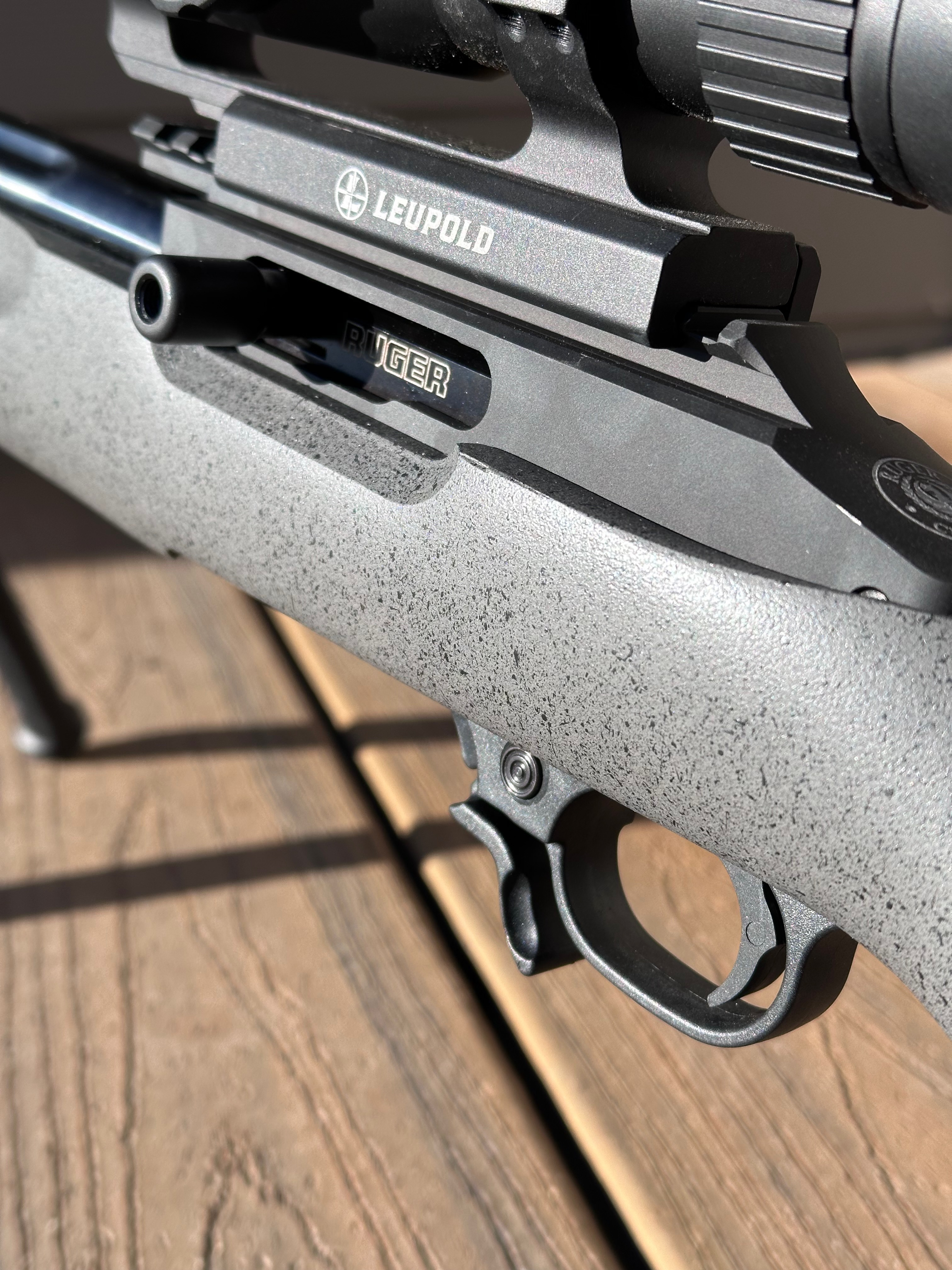
Andrew McKean
The most popular rimfire rifle in America is a literal pain in the face for left-handed shooters. I’m talking about Ruger’s 10/22, and if you’re a southpaw, you know the feeling of hot brass and gas spitting on your right cheek as you dump a magazine at paper targets, rimfire silhouettes, or tin cans.
Happily, Ruger has fixed that problem by offering its versatile 10/22 semi-auto in a lefty action. It’s available right now only through Ruger’s Custom Shop, as a tricked-out competition rifle. But given the hyper accuracy and upgraded barrel, stock, and trigger of this version, I’m not complaining.
There’s not much that hasn’t been said about the 10/22. It’s accurate, fast, reliable, fun, infinitely customizable, and affordable. The competition version of the gun is all those, plus accurate, minus affordable. Retailing for close to $1,000 it’s fairly pricey for a rimfire, but given its ability to win NRL22 competitions and furniture that fits just about any shooter, it’s a good investment. I’ll buy my left-handed version as a slave rifle for optics testing, a task that puts a premium on accuracy, reliability, and easy compatibility with a wide range of scopes. The Ruger’s 30 MOA Pic rail makes it a cinch to swap out scopes and enables long-range shooting. In testing a new riflescope from Athlon as well as rabbit hunting with Trijicon’s REAP-IR mini thermal scope, both CCI’s Green Tag and Federal’s 25-grain Small Game load shot lights-out (a term that’s especially appropriate for thermal hunting).
Among the noteworthy features of this southpaw competition model are the textured laminate stock with wonderfully grippy fore-end, adjustable cheek rest, and light trigger. Triggers in production 10/22s are truly horrible, but this version is light and consistent, with only a little sponginess on the take-up. I had a little problem with stove-piping when I shot my lefty Ruger with the 40-grain CCI load. If the action were canted in either direction, empties would tend to get caught in the action.
The other detail to note is that the 10-round rotary magazine that ships with the lefty 10/22 is specifically designed for the left-handed action. So you can’t swap out standard Ruger mags; instead you can order additional left-handed magazines should you want backups. But that’s a very small price to pay for left-handed shooters who can finally enjoy all the joys of a 10/22 with none of the gas-spitting insults.
Final Thoughts on Ruger 10/22 Competition Rifle Left-Handed Model
I’m torn between saying “about time,” and “worth waiting for.” So I’ll combine them to say this is an excellent version of a versatile rifle whose time has come.

